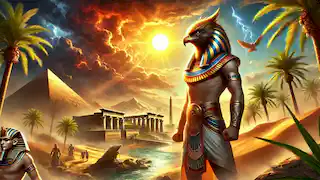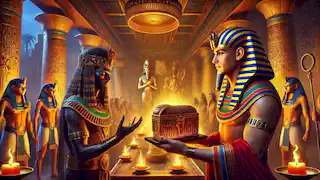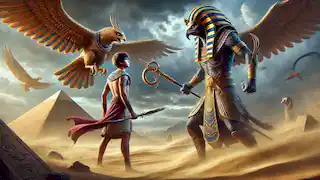The Legend of Horus
Reading Time: 8 min

About Story: The Legend of Horus is a Legend from egypt set in the Ancient. This Dramatic tale explores themes of Good vs. Evil and is suitable for All Ages. It offers Cultural insights. A divine battle for Egypt’s future in an epic struggle of light against darkness.
In the ancient lands of Egypt, where the golden sands stretched endlessly under the burning sun, and the sacred Nile flowed as a lifeline through the desert, legends were born and deities revered. Among these myths and gods, none was as powerful, as heroic, or as revered as Horus, the falcon-headed god of the sky, war, and protection. Born from divine heritage and destiny, Horus’s journey was one of vengeance, justice, and the triumph of good over evil. His legend began long ago, in an age when the gods themselves were believed to walk the earth.
This is the story of Horus's birth, his struggle to reclaim his father’s throne, and his battle with Set, the god of chaos. His tale is not only one of power and honor but also of sacrifice and resilience. Horus’s journey is a testament to courage in the face of overwhelming odds, a lesson of duty to one’s people, and a reminder of the eternal struggle between light and darkness. In the days of Egypt’s first kingdoms, the god Osiris ruled as both king and deity. He was beloved by his people, a ruler who brought them knowledge of agriculture, laws, and the ways of peace. Osiris’s reign was golden, marked by prosperity and joy. But as with all great lights, a shadow awaited in the form of his brother, Set. Set, god of chaos and the desert, envied his brother’s power and popularity. His heart, consumed by bitterness, sought to plunge Egypt into darkness. Set devised a plan so cunning and ruthless that none could foresee its horror. During a grand feast, Set presented Osiris with an elaborate sarcophagus, claiming it was a gift only fit for a king. Osiris, touched by his brother’s gesture, climbed inside to see if it fit. Set and his followers quickly shut the lid, trapping Osiris inside. They sealed the sarcophagus with molten lead and threw it into the Nile, where it was carried far away, leaving Egypt leaderless and the people bereft of hope. With Osiris gone, the kingdom mourned, and darkness spread across the land. Isis, Osiris’s wife and goddess of magic, was devastated but resolved to find her husband’s body and restore him. Using her powers, she searched every corner of Egypt until she finally discovered the sarcophagus lodged in the branches of a tamarisk tree in Byblos. Isis brought Osiris’s body back to Egypt and, using her sorcery, managed to revive him for a single night. From this union, Horus was conceived—a child born with the sacred duty of avenging his father and reclaiming the throne from Set. Knowing that Set would hunt the child, Isis hid in the Nile Delta, where she raised Horus in secrecy. As Horus grew, Isis trained him in the arts of combat, wisdom, and magic, preparing him for the day he would face Set. Horus was not just her son; he was Egypt’s last hope, the only one capable of restoring balance to the land. Horus’s childhood was anything but ordinary. Raised in the marshes, he learned the language of the animals, the secrets of the rivers, and the signs of the stars. Under his mother’s tutelage, Horus became proficient in swordsmanship, archery, and the sacred arts. His falcon eyes were sharp, capable of seeing across vast distances and sensing the intentions of others. Despite his rigorous training, Horus faced many hardships. Often, Set’s minions would find him, forcing Horus and his mother to move from one hiding place to another. But each battle, each encounter, only made Horus stronger and more determined. The young god knew that one day, he would face his uncle, the one who had stolen his father’s throne. His destiny was as certain as the rising and setting of the sun, a celestial dance in which he would be the warrior and protector, his father’s avenger, and Egypt’s savior. When Horus reached adulthood, he was ready to fulfill his destiny. With his mother’s blessings, he set out to face Set, who had now claimed the throne and ruled Egypt with an iron fist, his reign marked by storms, droughts, and suffering. The people, desperate for liberation, whispered of a hero who would rise to challenge Set, and that hero was Horus. The first confrontation between Horus and Set occurred in the heart of the desert. Set, wielding his serpent-headed staff, was a towering force, the embodiment of chaos and fury. But Horus, clad in the armor of the gods, stood resolute, his falcon gaze unyielding. Their battle was fierce, shaking the very earth and darkening the sky. Set, filled with rage, unleashed a storm of sand and lightning, but Horus, skilled in the arts of both combat and magic, countered every strike. They fought until dusk, but neither could claim victory, and the gods themselves were forced to intervene, calling for a truce. {{{_02}}} The gods, witnessing the struggle between Horus and Set, summoned a divine tribunal to decide the fate of Egypt’s throne. The tribunal was led by Ra, the sun god, and attended by Thoth, the god of wisdom, Ma’at, the goddess of truth, and other deities who held Egypt’s fate in their hands. The arguments stretched for years, with each god presenting their case. Set argued that he was the rightful ruler, as he had taken the throne by his own strength. Horus, however, claimed his birthright as Osiris’s son and the true heir. The gods, torn between the two powerful deities, struggled to reach a decision. At one point, Set challenged Horus to a series of contests to prove his worth. They competed in swimming, racing, and wrestling, each trial as fierce as the last. In every contest, Horus met Set’s strength with his own resilience, his determination unwavering. In the end, the gods ruled in Horus’s favor, recognizing his valor, rightful lineage, and devotion to Egypt. But Set refused to accept the decision, vowing to crush Horus and all who defied him. Their final confrontation would be remembered as the Battle of the Nile, a clash that would shape the destiny of Egypt and the gods themselves. Set, in a final act of defiance, summoned a monstrous serpent, Apep, from the underworld, a creature born of pure darkness. Horus, knowing the weight of his duty, summoned the falcon-headed warriors of Ra and his mother’s protective magic. The forces of light and darkness clashed upon the waters of the Nile, the sky torn by lightning, and the river itself turning red with the fury of the battle. Horus, with his keen sight, targeted Set’s weaknesses. He struck with precision and strength, but Set, empowered by his fury, was a relentless foe. As the battle raged, Horus’s eye was struck, causing him immense pain. But despite the injury, he pressed on, fighting with the strength of his ancestors and the hope of his people. With a final, powerful strike, Horus managed to wound Set, driving him back into the desert. The people of Egypt, witnessing the god’s triumph, rejoiced. Set was defeated, but Horus, though victorious, bore scars of the battle, a testament to his sacrifice. His eye, wounded in the fight, was healed by Thoth, becoming the Eye of Horus—a symbol of protection, royal power, and good health. From that day on, the Eye of Horus became a sacred emblem, revered by all who sought protection and prosperity. Horus ascended to the throne of Egypt, his reign marked by justice, wisdom, and peace. He ruled as a god-king, loved by his people, and his victory over Set became a legend passed down through generations. The story of Horus is a tale of resilience, courage, and the unbreakable bond between a god and his people. Even after thousands of years, his legend lives on, inspiring all who seek justice and strength. The Eye of Horus remains a symbol of protection, a reminder of the god who fought against darkness and reclaimed his father’s throne. Horus’s story is not just a myth; it is the heartbeat of Egypt’s history, a legend that transcends time. His battle with Set, his sacrifices, and his triumph over chaos are the very essence of the Egyptian spirit—a reminder that light, no matter how dim, will always conquer darkness. {{{_04}}}The Death of Osiris

Isis’s Quest
The Trials of Youth
The First Confrontation
The Divine Tribunal
The Battle of the Nile

The Victory of Horus
Epilogue: The Legacy of Horus

















